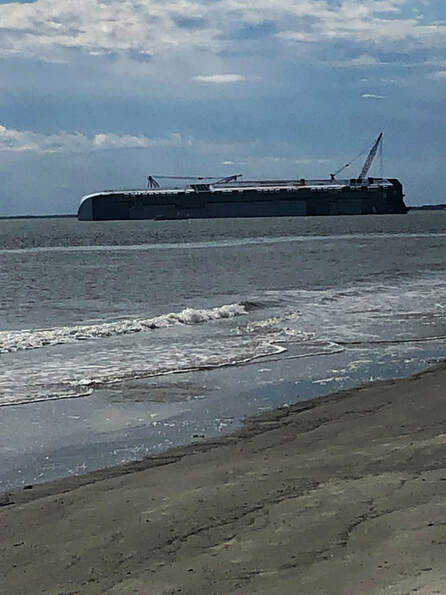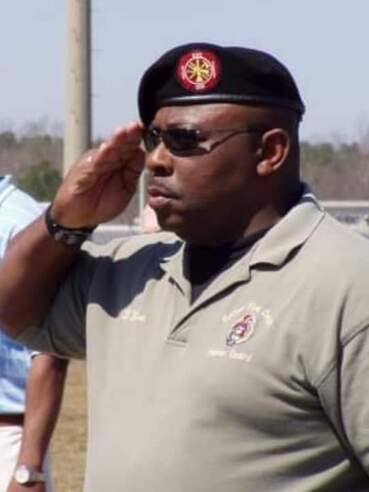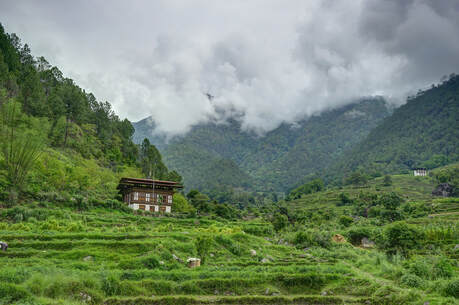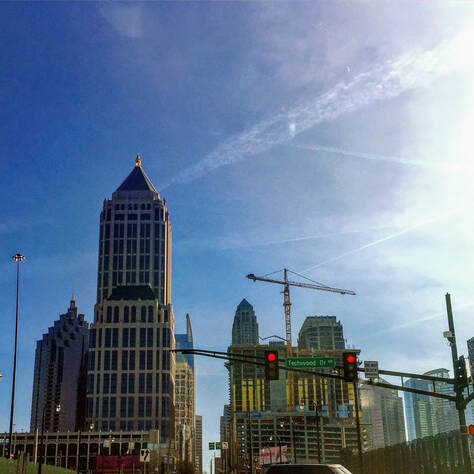 The Wreck of the Golden Ray, With its Cargo of Brand New Automobiles, Clutters the Georgia Coast The Wreck of the Golden Ray, With its Cargo of Brand New Automobiles, Clutters the Georgia Coast Sam Burnham, Curator The Corona Virus (COVID-19) is the new panic that is sweeping the planet. While narratives range from this being the common cold to it becoming a global pandemic causing the end of all life on Earth. The important story is not really about the disease itself. The important story is going to be buried because it doesn't fit nicely into the modern narrative. The important lesson here is about globalism and the dangerous place it has carried us. Let me start by saying that trade is not our enemy. Pure isolationism is not the answer to all of our problems, including the Corona Virus. Trade, when engaged properly, is a good thing. It adds variety to our economy and opens new markets for our products as well as provides us with products we might otherwise never see. Healthy trade benefits the economies and citizens of all the nations involved. But an honest glimpse at Southern history gives us a story of mismanaged trade. In the antebellum South almost all manufactured goods were foreign-made or at least made outside the South. As late as 1889, when Henry Grady addressed the Bay State Club of Boston, the situation had not changed much. His comments about attending a funeral in Pickens County related the fact that Georgia had plentiful resources but very few manufactured goods. Items needed for the funeral were all brought in from the cities of the North. "The South didn't furnish a thing on earth for that funeral but the corpse and the hole in the ground." Grady's point showed a hole in the Southern economy. Something was seriously missing. Balance is important and I certainly am not calling for Grady's New South or suggesting that the South look to heavy industry to solve its problems. Trade helps create a balance. Industrial centers can trade with resource centers and both can benefit. But balance is key.With too much reliance on industry we risk damaging the very resources we rely on and even altering our culture. With too little industry we become dependent on other locations to provide us with manufactured goods. This very morning (2/28/20) I heard from a health specialist appearing on the radio program 1A that between 80-90% of the ingredients for American generic pharmaceuticals are produced in China. So when there is an upheaval in China such as the Corona Virus or, God forbid, they go to war with us, our ability to produce medicine screeches to a halt. Keep an eye on the news, not for the stories designed to stir fear to drive ratings, but for the side effects. Notice all the products that are affected by the slowing of economic productivity in China. Well-balanced, healthy trade does not do this. Too many eggs in one basket does. Too few eggs in our own basket does. Again, balance. While we cannot possibly produce everything we need locally, the more we do produce locally, the more balanced our economy will be. There is certainly no excuse for any foreign nation to be producing 90% of anything as vital as medication. We have to produce more of this in our own country. Entrusting entire segments of the economy to other nations while merely assuming they will stay productive, stable, and solvent is a recipe for disaster. As China remains in quarantine and their productivity continues to drop, domestic businesses reliant on that productivity continue to suffer and our stock markets will continue to drop as a result. It is ridiculous that nations with smaller economies than ours drag our markets over their epidemics. We've benefited from cheap Chinese production but now we're paying the price for that. We'll survive this and they will to. But if we don't change the way we do things the next pandemic will just put us back in this same spot. Anything we do produce locally - food, clothing, furniture, electricity, you name it - will be independent of the downturns elsewhere. This is economic strength that we can build ourselves. We can build our local economies, improving the loves of our friends and neighbors, insuring economic security in hard times, and keeping our needs from being capsized in ships on our shores. A productive local economy is good for us, our neighbors, future generations, our local environment, and our planet. When you are in the market to purchase something, put a higher value on things that are produced locally, in your state, or in your region. Value should matter more than cost. Local products may cost more but they will usually be of a higher quality and will have a give more economic benefit to your local economy. Reward makers who are working to provide us with these options. Like I said, it won't always work. There are things we must import but you might be surprised at how much you can find that was made just down the street.
0 Comments
 Sam Burnham, Curator I first met Danny Lee in the spring of 1998, just a few weeks shy of 22 years ago. I was fresh out of college and beginning what would become a 21 year career in the fire service. He was roughly a year and a half ahead of me on that career path and one of his assignments placed him close to the training facility where I was learning the basics. He won me over from the very beginning. We became fast friends. Throughout the next 21 years our careers overlapped often. We were never permanently assigned together but we worked different sifts at the same station on numerous occasions. We also worked in neighboring stations and responded to calls together. But it was in the Honor Guard that we really bonded. Our duties in that branch of our department included honoring the lives of our friends and coworkers who had slipped the bonds of this world and entered the next. For that reason I feel it is appropriate that I'm here doing that very thing for him. As I look back at his career one fact rises above the rest. He was a man who went out of his way to help his coworkers better themselves. He offered his advice, he offered his time, and he offered his resources to enable people to put their best foot forward. He just had a way of helping people realize their strengths and how to use them. He had, in a sense, recreated himself and had a lot of insight on advancing, growing, bettering yourself. But the profession was merely what created proximity. Friendship was bigger than that. Through many conversations around the fire hall or during down time at a cemetery detail we talked about life and death and all those entail. We had a lot in common including a love of funk music - particularly Parliament and also Bootsy Collins. We laughed a lot. We both loved history and travel. We often talked politics and religion, a rare delicacy these days. One of the best compliments I've ever received was Danny telling me that he and I had some of the best conversations he had ever had. We often disagreed on things, but we always listened and we always respected each other. That's the way it should be. It is because of those discussions, particularly the ones on faith, that I know I'll see my friend again. We shared the same faith, the same God. Perhaps that's ultimately why we got along so well. I long suspected this day would eventually come. Danny was closer to my parents' age than mine so I always figured I'd one day write a memorial for him. But this is still so premature. He was not an old man by any means. He was taken from us by a cruel disease that may have been a result of the very service to others he dedicated his life to. He's leaving behind so many people who loved him so dearly. It is easy to share the platitudes of one day seeing him in eternity. Reality slaps me though when I think of his wife, his children, and his grandchildren and how this tragedy tears at their lives. It just doesn't seem fair. Our last meeting was bittersweet. But we parted with a handshake and a smile. That's how I want to remember him. He had a large personality and he used it to serve others - the Army, the fire department, in his church, and in his personal life. But a handshake and a smile is what I want to remember because when you tear it all away, he was my friend. That's what matters. Memory eternal.  Bhutan Before They Ruin It [Photo Credit: ShutterStock] Bhutan Before They Ruin It [Photo Credit: ShutterStock] Sam Burnham, Curator It is doubtful that anyone would think less of you if you were unable to locate Bhutan on a map. Nestled in the eastern Himalayas between India and China, this Buddhist kingdom is noted for monasteries and fortresses, so seclusion and obscurity have kept Bhutan independent over the centuries. In this age of globalism, however, there is almost no place that isn't susceptible to the all-seeing eye of modern opportunity. So I wasn't really surprised when the South Asian branch of the World Bank tweeted out an article on the profit potential of Bhutan's forests. The nation is currently estimated as being 71% covered by forests. The nation treasures these forests and has constitutional restrictions that set 60% as the minimum allowable coverage area for forests. Sure the article is peppered with terminology suggesting that the World Bank is wanting to help maintain the forests and protect Bhutan's natural beauty. But I'm still skeptical. Really that's a conservative way of saying it. Honestly, I'm calling them out here. It is too easy to use the right words, say the right things, put on the right appearances, and then rob some good people blind. Consider the way Atlanta markets itself as "the city in a forest." Anyone who has sat in traffic on the Downtown Connector anywhere between 14th St and University Ave knows that such a claim is a load of manure. Sitting in the Grady Curve with a blown AC unit on a hot sunny day, window down, choking on the fumes in the humid air will make you wish you were in a forest. No, Atlanta is a city in what used to be a forest. It might even be a city surrounded by a forest. But back to Bhutan.  "The City in a Forest" "The City in a Forest" A nation that is 71% covered by forests remains a net importer of forest products. Is there something they could do to add economic strength with their forests? Of course there is. Wendell Berry talks a lot about the economic potential of the forests in his native Kentucky. But he champions truly sustainable ways of doing it. There are ways of managing the forest, of harvesting timber that is good for both the economy and the forest. It is also essential that Bhutan, rather than China, India, the United States, or the World Bank, determine the way in which their forest is monetized. They certainly don't need the forces of globalism tweeting out that they have untapped resources for every greedy industrialist waiting to make a quick buck at someone else's expense. Bhutan might need some advice on how to develop this corner of the economy. But we should also remember that the most secure culture in the world is found on North Sentinel Island in the Indian Ocean where the people tend to be hostile to outsiders, eating the majority of the visitors who have appeared on their shores and usually trying to kill outsiders before they land. Just because we might think Bhutan needs our help, doesn't mean that they want it. Just as we don't want arrogant outsiders poking their noses in our business, it stands to reason that Bhutan feels the same way. |
Sam B.Historian, self-proclaimed gentleman, agrarian-at-heart, & curator extraordinaire Social MediaCategories
All
Archives
November 2022
|




 RSS Feed
RSS Feed
